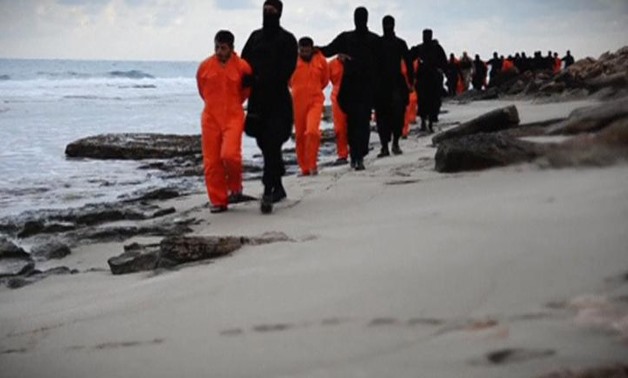
Egyptian Christians held captive by IS militants 2015 -
REUTERS TV
CAIRO – 4 June 2017: Defendants from a 2015 case have given pivotal testimony on the recruitment and radicalization methods of the Islamic State (IS) group.
Defendants in case no. 239/2015 belonging to a terrorist cell in Marsa Matrouh affiliated with IS in Libya gave the testimony earlier in the public prosecution’s investigations, information which has only recently been made public.
One defendant, Mahmoud Abdel Samie, revealed during interrogations the exit methods adopted by IS to move from Egypt to Libya and the locations of the terrorists’ training camps. He said IS’ creed is based upon excommunicating the state, the ruler, the army, the police, the judiciary and Christians, and appropriating their assassination. He said he learnt such beliefs from Sheikh Mohamed Hegazy.
Egypt has closed its borders with Libya since the eruption of the civil war in 2011. In addition, there have been constraints on citizens below the age of 40 travelling to Turkey, Qatar, Syria, Iraq and Libya since 2014, as they have to get a security permit first, according to Al Arabeya.net.
Abdel Samie explained that he first wanted to join IS in Syria so first he had to travel to Libya, resorting to cross-border infiltration, where he remained and fought for IS in Libya as he received training in the desert of the Libyan city Sirte. Later on, he was given a Kalashnikov rifle and 85 bullets but never made it to Syria.
His first operation was an attack on an ammunition store belonging to the Libyan National Army. Twenty-five militants were involved, divided among eight cars in two groups. Four cars executed the attack while the others secured them. However, they found no ammunition in the store.
Abdel Samie said he participated in ambushes to capture members of Fajr Group, another militant terrorist group in Libya, in addition to bombing an oil field used for funding the national army. He also guarded an African Christian who was abducted by IS. The man was later slaughtered along with 21 Egyptian Christian workers in Libya in 2015. The video of slaughtering was uploaded online.
He admitted that his partner in all said crimes was Abdullah Dakhil, who was smuggled with him and 30 others to Libya by a smuggler called Krouma. They first headed to a house in Salloum, a border area, where they found 500 individuals heading to Libya for work.
The trip began by walking in groups of 100 each for 24 hours until they reached a poultry farm located in the desert near the Libyan border city of Masaed. Then, they were put in four-wheel-drive cars and transferred to Tabrag and then to Ajdabiya. The person who received them there collected their mobile phones and asked them to choose nicknames and not mention their real names.
Abdel Samie said they were transferred to Sirte where they were brought to a location called ‘internal security,’ which was surrounded by a fence and comprised of four buildings. One was for receiving immigrants, the second a prison, the third for security guards and the fourth for services.
He later paid allegiance to IS leader Abou Bakr El Boghdady through the Wali (ruler) of IS in Libya, Abou Abdel Aziz, an Iraqi national who refused to send the 40 new militants to Syria as they were needed in Libya.
Abdel Samie admitted that he and his fellow recruits received a religious course following the military training course. They were told that the goal of their operations was to divide Libya into three smaller states: Tripoli and western Libya, Fezzan and southern Libya and Burqa and eastern Libya, which would extend to the Egyptian city Marsa Matrouh, and that all fall under the rule of Abdel Aziz.
In 2015, Abdel Samie escaped through a relative to Egypt, where he and others were arrested upon data collected by Egyptian intelligence. He learned from IS member Abou Osama El Masry that the group had accused him of espionage, which has been a recurring accusation often resulting in the termination of many IS militants. This was reason Abdel Samie and two other IS militants, Islam Fahmy and Mohamed Tibany, returned to Egypt.
Later on, Abdel Samie came into contact with Abou Ayounb El Ghazawy through Viber, who instructed him to remain in Egypt and search for potential recruits who would receive the looted oil from fields that IS had taken over in Libya.

Comments
Leave a Comment